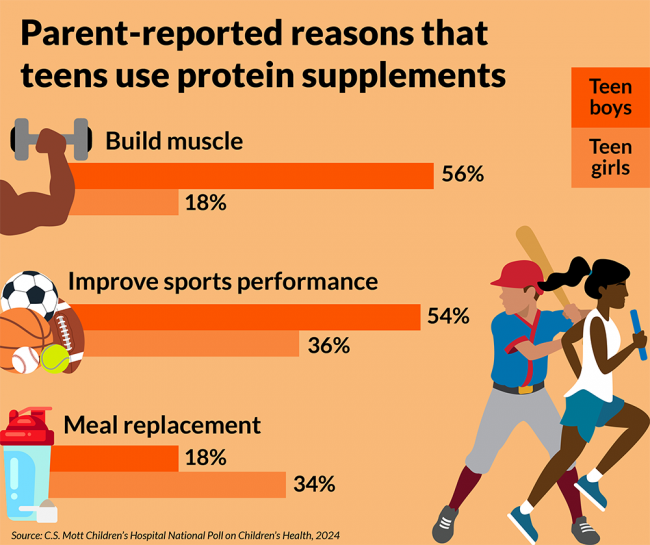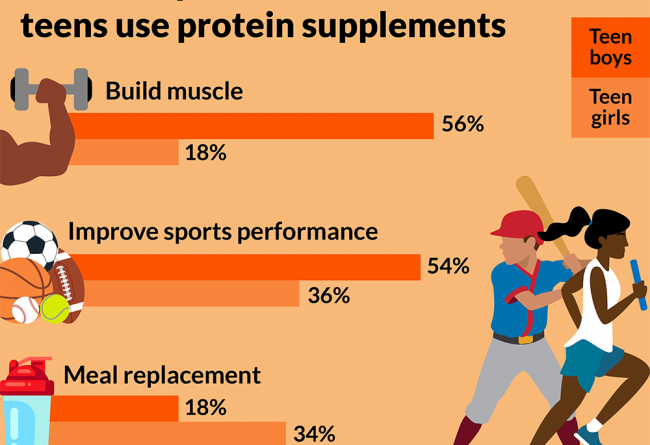Youth and protein
Protein is part of a healthy diet, but it can be difficult for parents to know if their child is consuming the right amount of protein. The CS Mott Children’s Hospital National Poll on Children’s Health asked a national sample of parents about protein and supplement intake for their 13-17 year olds.
Two in five parents, and more parents of boys than parents of teenage girls, say their teen has taken protein supplements in the past year (46% of boys vs 36% of girls; 41% of overall), including protein bars (31% of boys. vs 27% of girls 29% overall), shakes (28% of boys vs 19% girls; 23% overall), or powder (20% of boys vs 10% girls; 15% overall), or following a high-protein diet (7); % boys vs 2% girls 4% overall). Among those reporting that teens take supplements, more parents of boys than girls report that teens use protein supplements every day (31% of boys vs 15% of girls; 23% overall). .
Most parents of boys say their teens eat protein that helps build muscles (56% boys vs 18% girls; 38% overall) and improve sports training/performance ( 54% of boys vs 36% of girls; 46% overall), while more parents of girls believe that supplements are used to replace meals when they are too busy to eat (18% of boys vs 34% of girls) ; 26% overall), eating healthy (14% boys 26% girls; 20% overall), and helping with weight loss (6% boys vs 11% girls ; 9% overall).
Among parents whose teens take protein supplements, 44% say they or another family member recommended protein, along with coaches or teachers (26%), other students (21%) , social media (10%) and health care providers (9%). ). Parents are more likely to say their child is using protein supplements if they notice any of the following very important for their youth: getting in shape, losing weight, looking attractive, improving sports performance, and general well-being.
Two-thirds of parents think their teen’s protein intake is about right (67%), while others think it’s too little (18%), too much (1%), or they’re not sure (14%). More than half of parents (59%) think that a diet high in protein is good for their young ones. A third of parents (33%) use protein supplements themselves; These parents are more likely to report that their teen also consumes protein supplements (54% vs 18%).

Highlights
- Almost one in five parents think their child is not getting enough protein.
- 2 in 5 parents say their teen has taken protein supplements in the past year; this is higher in young boys than girls.
- 1 in 3 parents use protein supplements themselves and are more likely to report that their child also takes protein supplements.
Results
Protein is important for building and strengthening muscles, developing healthy skin and organs, hormone production and strengthening the immune system. In general, the Recommended Dietary Allowance (RDA) for protein is 46 grams per day for teenage girls and 52 grams per day for teenage boys, but the ideal amount of protein for an individual is will vary by age, gender, weight and level of physical activity. .
Two-thirds of Mott Poll parents felt their teen was eating the right amount of protein. Too much or too little protein can be a problem. Long periods of too little protein can cause muscle loss, fatigue, or worsening mood swings. Long-term protein intake can result in nausea, dehydration, stomach pain, or kidney problems.
In general, most teenagers can get enough protein from a nutritious diet. However, it can be difficult for parents to ensure that their child is getting the right amount of protein. In order for parents to do so, they should pay attention to protein-rich foods, including eggs, nuts, fish, lean meats, lentils and dairy products, and offer them regularly as part of meals. balanced.
This Mott poll shows that many young people eat protein shakes as a meal replacement. For example, when teenagers are sleepy and not interested in eating breakfast, well-intentioned parents may take their teen to school by what they believe is a better alternative. However, high protein does not necessarily mean good health; many high protein products are high in sugar and caffeine which is not healthy for young people. Parents can read product labels to find options that contain specific protein as well as fiber and other nutrients, with little or no added sugar.
This Mott poll also highlights that many young people use protein supplements, especially protein powders, to improve their sports performance and / or build muscle. When a teenager exercises vigorously, some muscle cells are broken; protein helps repair this damage (often called “recovery”) and rebuild muscles. For this reason, young people who engage in vigorous physical activity need more protein than the RDA. The best way to get more protein is by eating a balanced diet. In some cases, protein powder can be used as a supplement, but it does not provide the need for a teenager to consume protein in a balanced diet. Additionally, it is important for parents and teens to remember that consuming more protein than your body needs will not result in greater or faster muscle gains.
When teens and parents are considering protein supplements because they can’t get the nutrients they need through their diet, they may be overwhelmed by the choices, including a variety of protein supplements such as whey. and casein that provide various benefits. Parents and teens may want to consult with the teen’s primary care provider or nutritionist to determine which products will best fit the teen’s goals, as well as the appropriate amount and schedule. take supplements.
Nearly one in 10 parents in the Mott Poll indicated their teens use protein supplements to help lose weight. A high-protein/low-carb diet is preferred by many adults, and more than half of parents think a high-protein diet is healthy for their teen. So, it is not surprising that some young people try to eat this type of food. However, high-protein diets are generally not recommended for young people, as there is a risk that they will not get all the essential nutrients, including carbohydrates, that they need for of proper nutrition.
Young people who follow a vegetarian or vegan diet may struggle to get enough protein in their regular diet because only certain plant foods (for example, soy and quinoa) are good sources of complete protein. However, this issue can be easily resolved by eating a variety of plant foods throughout the day which together will provide the body with the building blocks needed to meet protein needs. In addition, low-fat dairy options such as Greek yogurt are good sources of protein that can be added to vegetarian meals.
#Youth #protein
